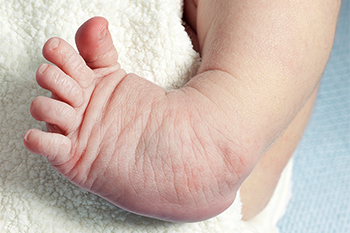

Clubfoot is a congenital condition where a baby’s foot or feet are twisted inward and downward, making them appear abnormal in shape and position. The exact cause of clubfoot is not fully understood, but it is believed to be a combination of genetic and environmental factors. It may occur when the tendons in the foot are too tight or shortened, causing the foot to rotate. In some cases, it can be associated with other conditions such as spina bifida or cerebral palsy. Symptoms of clubfoot include the foot appearing rotated, with the sole facing inward and the heel pointing downward. The affected foot may be smaller than normal, and the calf muscles may appear underdeveloped. If your child has been born with clubfoot, it is strongly suggested that you include a podiatrist on your healthcare team for effective treatment results.
Congenital foot problems require immediate attention to avoid future complications. If you have any concerns, contact Dr. Alan J. Spector of Shore Podiatry. Our doctor can provide the care you need to keep you pain-free and on your feet.
Congenital foot problems are deformities affecting the feet, toes, and/or ankles that children are born with. Some of these conditions have a genetic cause while others just happen. Some specific foot ailments that children may be born with include clubfeet, polydactyly/macrodactyly, and cleft foot. There are several other foot anomalies that can occur congenitally. What all of these conditions have in common is that a child may experience difficulty walking or performing everyday activities, as well as trouble finding footwear that fits their foot deformity. Some of these conditions are more serious than others. Consulting with a podiatrist as early as possible will help in properly diagnosing a child’s foot condition while getting the necessary treatment underway.
What are Causes of Congenital Foot Problem?
A congenital foot problem is one that happens to a child at birth. These conditions can be caused by a genetic predisposition, developmental or positional abnormalities during gestation, or with no known cause.
What are Symptoms of Congenital Foot Problems?
Symptoms vary by the congenital condition. Symptoms may consist of the following:
Treatment and Prevention
While there is nothing one can do to prevent congenital foot problems, raising awareness and receiving neonatal screenings are important. Early detection by taking your child to a podiatrist leads to the best outcome possible.
If you have any questions please feel free to contact our office located in Point Pleasant, NJ . We offer the newest diagnostic tools and technology to treat your foot and ankle needs.